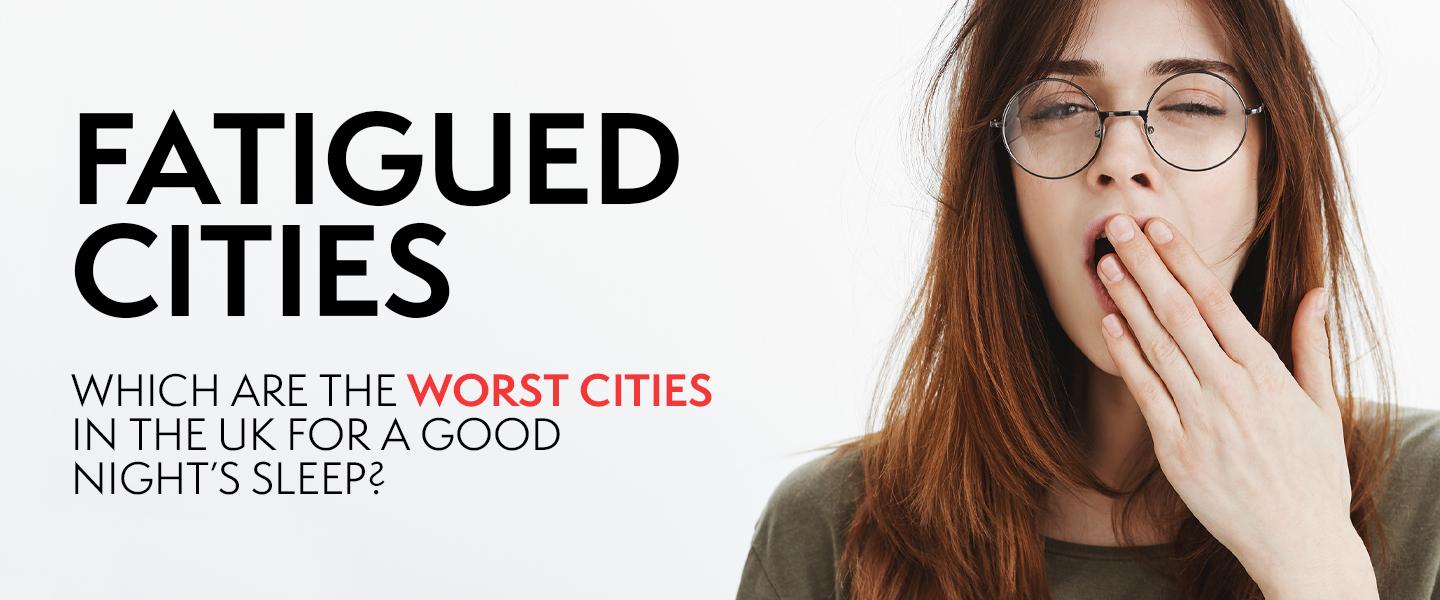Fatigued Cities
Which are the worst cities in the UK for a good night’s sleep?
Sleep is incredibly important for our health, both mental and physical. Not getting enough sleep impacts our ability to work, play and live life to its fullest. However, many adults report sleeping less than the 7-9 hours per day recommended by the National Sleep Federation. This can have long-lasting effects on our mood and health, leaving us feeling fatigued and unable to complete daily tasks with ease.
There are many things you can do to get more, better quality, sleep. One of the best ways to do this is by getting into a regular sleep routine, going to bed and getting up at the same time each day. This trains your body to recognise that it is time to rest, helping you to drift and achieve longer stretches of deep, restorative sleep.
Other things you can do to improve your sleep include getting a mattress that is suitable for your weight and sleeping position, banning screens from the bedroom, using appropriate duvets and pillows for the season, and sleeping with the correct number of pillows to suit your individual needs.
However, despite much information on how to improve your sleep being widely available for free online, there is still a widespread lack of understanding about how to get a good night’s sleep. With this in mind, we wanted to find out which parts of the UK experience the worst quality sleep, and which countries are at higher risk of fatigue.
The UK cities with the most sleep problems
We took an extensive list of sleep-related search terms and found how many times people had searched for them in Google over the past 12 months. We compared the number of searches in the fifty most populated towns and cities in the UK. Here’s what we found:
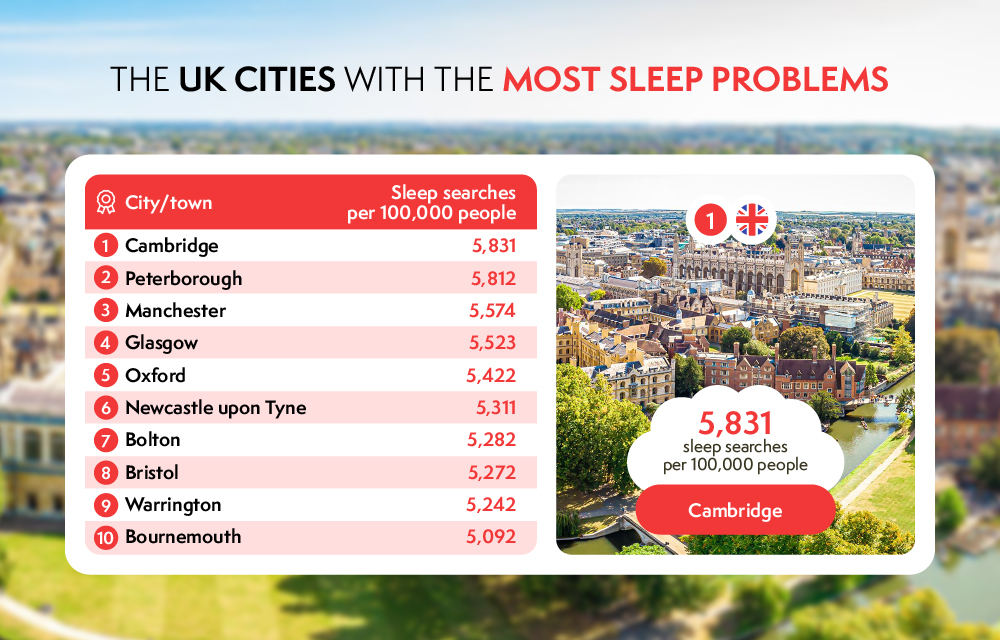
- Cambridge. Sleep searches per 100,000 people: 5,831
Cambridge is the UK city with the most sleep problems, having recorded the most sleep-related searches of anywhere in the country. With 5,831 sleep searches per 100,000 people, it’s evident that the residents of Cambridge could do with some help catching their forty winks.
- Peterborough. Sleep searches per 100,000 people: 5,812
Not far behind Cambridge is Peterborough, with 5,812 sleep searches per 100,000 people. This shows that, for some reason, the locals of Peterborough aren’t sleeping well, and are turning to Google for answers.
- Manchester. Sleep searches per 100,000 people: 5,574
Manchester took third place with 5,574 sleep searches per 100,000 residents. This busy Northern city is a hive of activity with many late-night distractions to keep you up into the early hours. Maybe this is why Mancunians are looking online for answers to their sleep troubles.
UK cities that get the best sleep
On the other hand, these are the towns and cities that looked up sleep problems the fewest times, indicating that they have relatively little trouble visiting the land of nod.
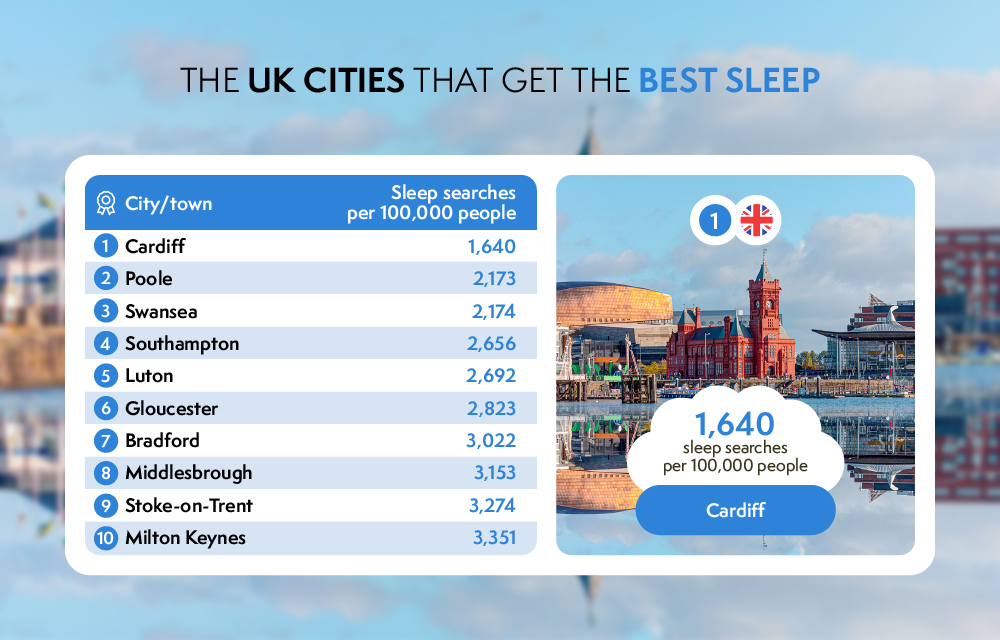
Cardiff. Sleep searches per 100,000 people: 1,640
Cardiff is the UK city with the fewest searches for sleep problems in the country, totalling only 1,640 per 100,000 people. This indicates the people of Cardiff experience much better sleep than most, leaving them well-rested and able to face the day.
- Poole. Sleep searches per 100,000 people: 2,173
Poole is the second-best location in the UK for sleep, with 2,173 sleep searches per 100,000 people.
- Swansea. Sleep searches per 100,000 people: 2,174
Taking third place is Swansea, just recording more sleep searches than Poole with 2,174 per 100,000 people.
Conversely, all three of the top sleep cities in the UK are situated by the sea, suggesting that the sea air could have a positive impact on your ability to sleep well.
It’s also worth noting that both of the Welsh entries made the top three out of the 50 biggest towns and cities.
The most fatigued countries
We also looked into how fatigued people in different countries are likely to be based on a number of different factors such as the number of hours worked per year and average screen time per day, among several others. We’ve combined these various metrics into a single score to show the relative level of fatigue to be expected in countries across the world.
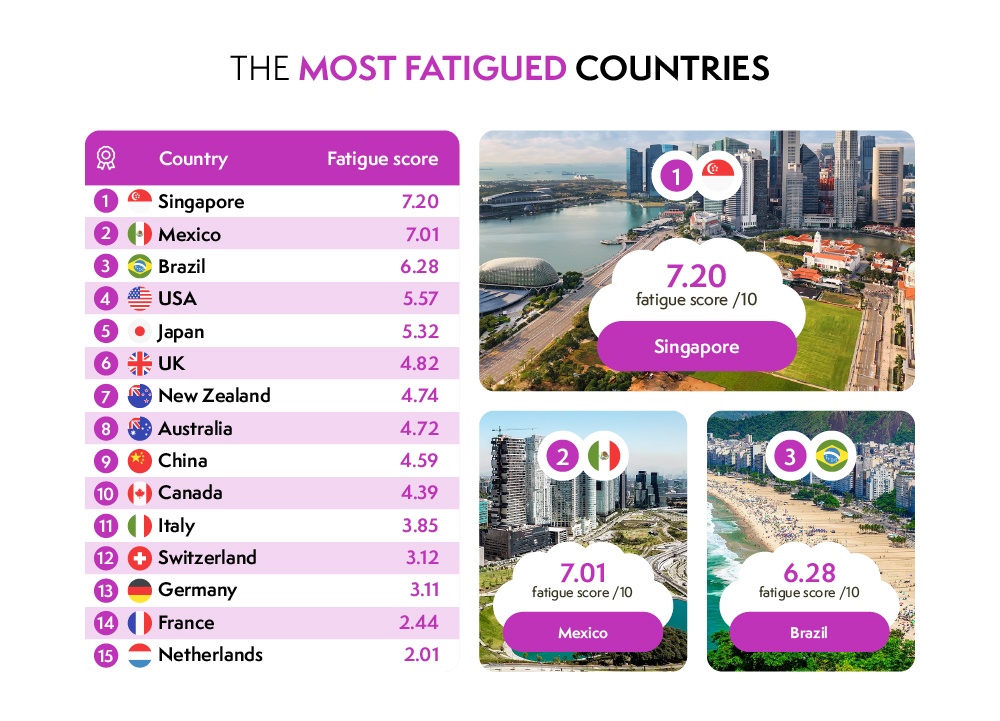
- Singapore. Fatigue score: 7.20
The most fatigued country is Singapore, with a fatigue score of 7.20. This small island nation in Southeast Asia is a bustling tech hub that has experienced rapid and widespread urbanisation. The busy lives of Singaporeans reflect this, leading to high levels of fatigue.
- Mexico. Fatigue score: 7.01
Mexico is the country with the second-highest fatigue score of 7.01. Mexico is the ninth-largest economy in the world and is a major exporter of silver, oil, cotton and coffee., so perhaps their growing economy is impacting the work-life balance of its working population.
- Brazil. Fatigue score: 6.28
Brazil is the third most fatigued country, with a fatigue score of 6.28. This huge South American country is a major producer of iron, steel, petroleum and cement, while also being home to a fast-growing technology sector.
The least-fatigued country is the Netherlands, with a fatigue score of just 2.01! Known for their laid-back attitude and beautiful cities, it’s no wonder that the Dutch experience so little fatigue.
Countries that work the most hours per year
By working longer or more unsociable hours, we give our bodies and minds less time to rest and recover. Repeatedly over-working can lead to serious levels of fatigue.
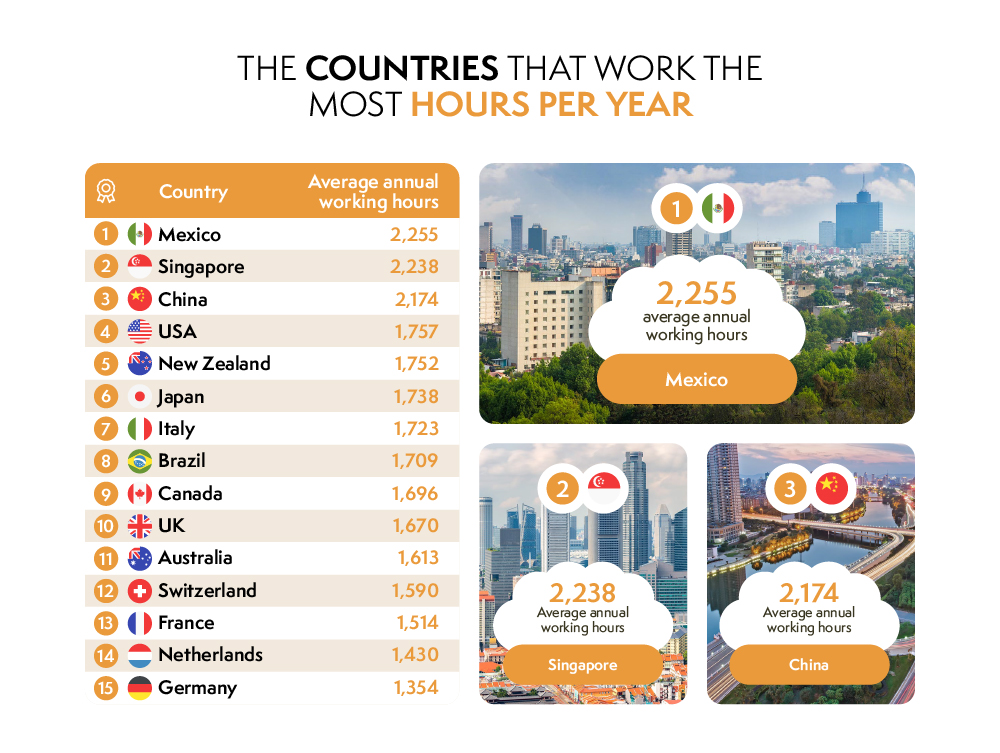
- Mexico. Average hours worked: 2,255
Mexican citizens work the most hours per year, clocking in 2,225 hours annually. This equates to working approximately 8.67 hours a day, five days a week with no holidays. That’s a lot of hours to put in!
- Singapore. Average hours worked: 2,238
Singaporeans work on average 2,238 hours per year, making them the second most worked population. The huge amount of time they put into their work would start to take its toll on anyone, leading to feelings of fatigue.
- China. Average hours worked: 2,174
In China, people work around 2,174 hours each year, making it the country that works the third most hours. Working such long hours can have a negative impact on your ability to enjoy time outside of work, as you might often be too tired or stressed to relax properly.
Germany is the country that works the fewest hours per year, totalling just 1,354 hours on average. A “work smarter, not harder” approach allows Germans to enjoy relatively few hours of work per year yet still retain their reputation for efficiency. Striking a good work-life balance is incredibly important to the welfare of workers, and can motivate them to put more effort into their jobs.
Countries that spend the most time on the internet
Staring at screens for an extended period of time not only puts great strain on your eyes, but the blue light given off by screens makes it more difficult to enter deep restorative sleep. With that in mind, we’ve compared our list of countries by the amount of time spent on the internet each day.
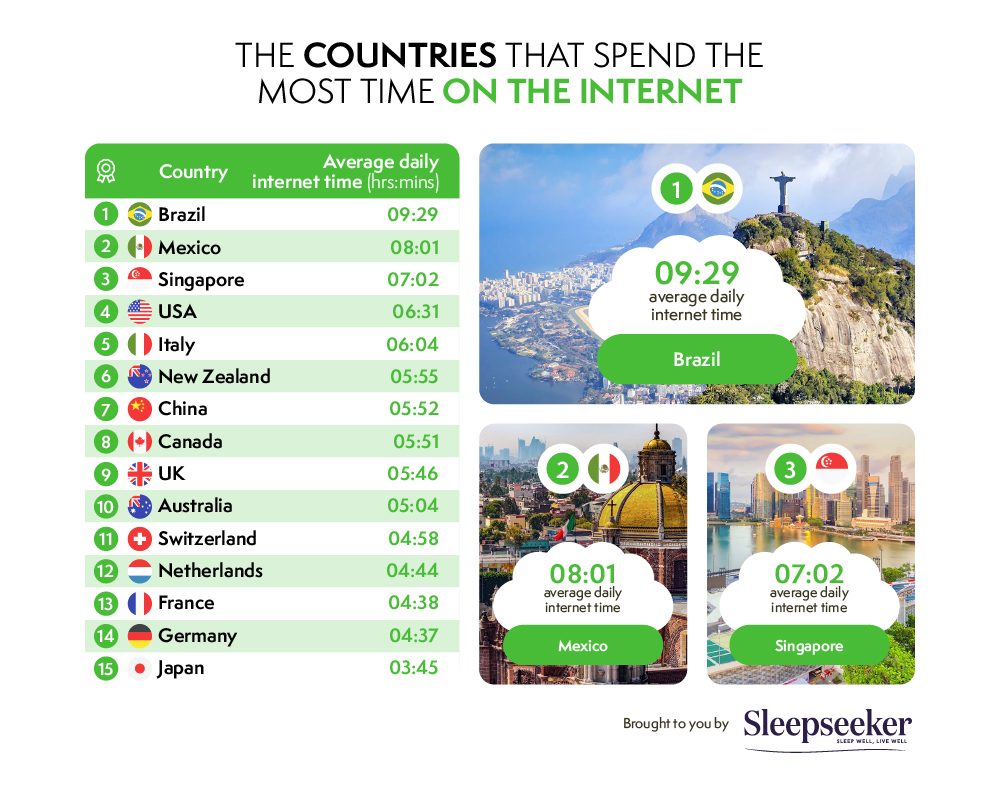
- Brazil. Daily internet time: 09:29
Brazil is the country that spends the most time on the internet, averaging 9 hours and 29 minutes each day. Spending so long staring at a screen is damaging to your sleep, due to the harmful blue light that they emit. Spending around an hour and a half longer on the internet than the runners up will surely leave Brazilians feeling tired and fatigued.
- Mexico. Daily internet time: 08:01
Mexico is the country that spends the second-longest amount of time on the internet, totalling 8 hours and 1 minute per day. This will likely leave Mexicans feeling the effect of poorer quality sleep, impacting their energy levels throughout the working day.
- Singapore. Daily internet time: 07:02
In third place is Singapore, whose residents spend 7 hours and 2 minutes on the internet every day. By limiting the amount of time spent on the internet or looking at screens, Singaporeans would be able to get much better quality sleep and reduce their feelings of fatigue.
The country that spends the least time on the internet is Japan, where people are only online for an average of three hours and forty-five minutes per day.
Methodology
UK
We wanted to find out which towns and cities in the UK experience the most sleep problems, which can lead to them feeling fatigued. We also wanted to see how countries compare on a range of factors that contribute to fatigue. To do this, we first focused on the 50 most populated UK cities and towns.
In order to judge how well the residents of each city slept, we created a list of search terms around the topic of sleep that people might be using to look up their sleep problems. We used answerthepublic.com for insight into commonly searched terms on this topic. We then used Google Keyword Planner to find out how many searches each term had received in each town and city over the last 12 months.
We combined the figures for each search term so that we could see the total number of sleep-related searches in each town and city before calculating the number of sleep-related searches per 100,000 residents in each place.
Global
To compare which countries were the most fatigued, we used a combination of four different variables. The first of these variables was the amount of time slept in each country, as we took a list of 16 countries and the amount of time they slept from Statista. This data showed us how many hours and minutes above or below the recommended eight hours of sleep were slept on average in each country.
The next set of data was from BusinessFibre.co.uk, which looked at the amount of screen time that people in different countries recorded per day. We then collected data from Wikipedia on the number of hours worked in each country on average per year.
Our last dataset was search data taken from Google Keyword Planner. We used a list of sleep-related search terms, translating them into the appropriate language for each country, and found how many searches each term received. We then totalled the searches for each country and found the rate per 100,000, using the number of Google users in each country as our population figure. We used this figure instead of population statistics as China had a very low number of Google users and searches compared to its population, so this was considered to be more representative in this instance.
We then gave each country a normalised score out of ten on each of the four factors, before taking an average ‘fatigue score’ across all four.
Note that the United Arab Emirates was omitted due to data not being available across all variables.
What's trending now...
-

Slumberdown Super Support Firm Support Side Sleeper Pillow, 2 Pack
£17.00
Shop Now -

Slumberdown All Seasons Combi 15 Tog (10.5 + 4.5 Tog) Double Duvet
£30.50
Shop Now -

Slumberdown Paws for Slumber Olive Green Pet bed, Medium
£39.00
Shop Now -

Slumberdown Wonderful Wool Mattress Topper, King
£60.00
Shop Now -

Slumberdown Paws for Slumber Extra Large Pet Bed Spare Cover, Grey
£20.00
Shop Now -

Snuggledown Luxurious Hotel Cotton Waterproof Mattress Protector, Double
£23.50
Shop Now -

Slumberdown Wonderfully Warm Electric Blanket - Single
£60.00
Shop Now -

Slumberdown Teflon Pillow Protector - Pack of 2
£14.00
Shop Now -

Slumberdown Unwind Outside 2-in-1 Waterproof Cocoon Set, Burnt Orange
£30.00
Shop Now -

Slumberdown Paws For Slumber Sherpa Pet Bed, Medium
From: £25.00
Shop Now -

Slumberdown Super Support Firm Support Side Sleeper Pillow
From: £17.00
Shop Now -

Slumberdown All Seasons Combi Duvet
From: £25.50
Shop Now -

Slumberdown Paws for Slumber Medium Pet Bed
From: £39.00
Shop Now -

Slumberdown Wonderful Wool Mattress Topper
From: £54.50
Shop Now -

Slumberdown Paws for Slumber Extra Large Pet Bed Spare Cover
From: £20.00
Shop Now -

Snuggledown Luxurious Hotel Cotton Waterproof Mattress Protector
From: £19.50
Shop Now -

Slumberdown Wonderfully Warm Electric Blanket
From: £60.00
Shop Now -

Slumberdown Unwind Outside 2-in-1 Waterproof Cocoon Set
From: £30.00
Shop Now -

Slumberdown Body Support Pillow, 1 Pack, Includes 100% Cotton Pillow Case
£20.00
Shop Now -

Slumberdown All Seasons Combi 15 Tog (10.5 + 4.5 Tog) King Size Duvet
£34.00
Shop Now -

Slumberdown Paws for Slumber Olive Green Pet Bed, Large
£49.00
Shop Now


